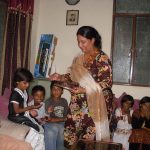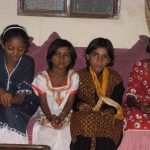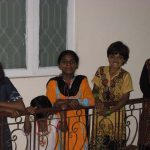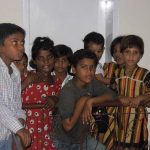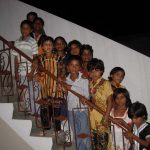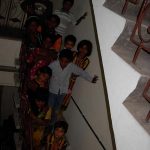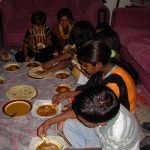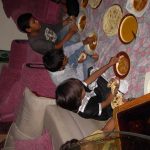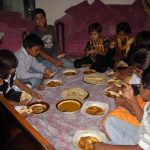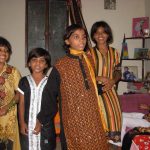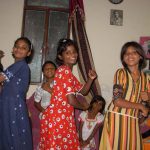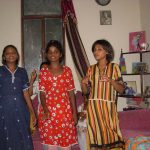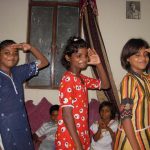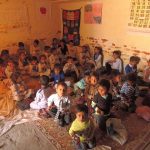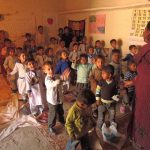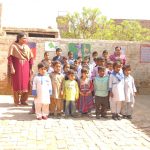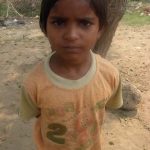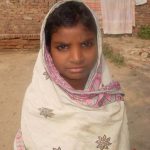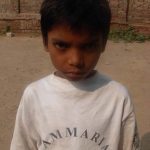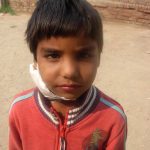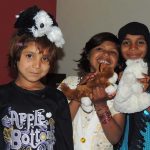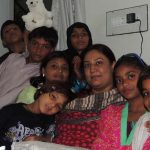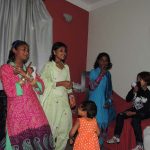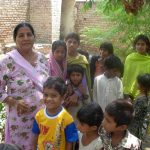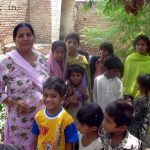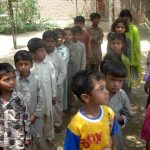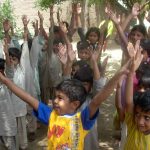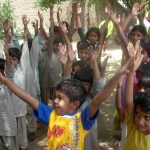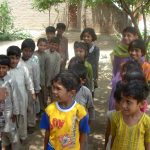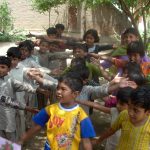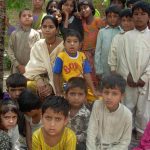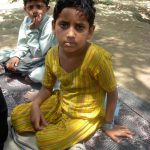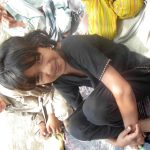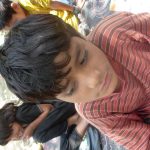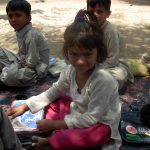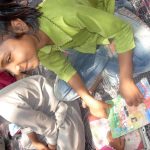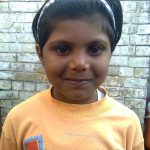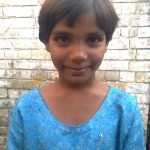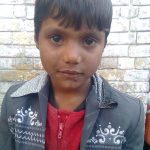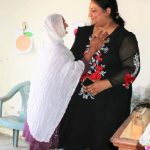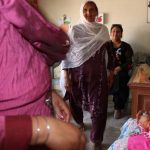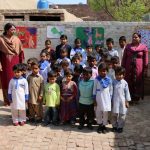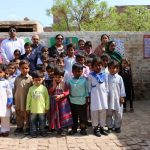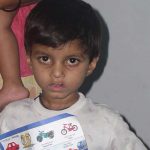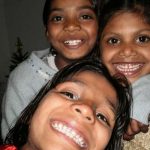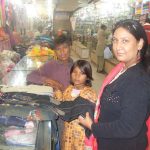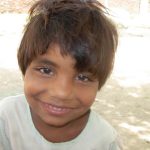“Defend the cause of the weak and fatherless; maintain the right of the poor and oppressed”, (Psalm. 82:3)
The Project:

The Voice is providing education, health, skills, and reinstatement to the destitute children and to build up the alleviation, cooperation and coordination between them and the society. The Voice is working for the welfare and the elimination of the social evils that abuses the children and causes them physical and mental harms and ineffectiveness that stays along with them throughout their lives.
The Voice is working for more then145 street-children with poor back ground or are abused as child labour. The work has already being carried out in the regions of the Punjab, with friends’ until now. Currently ninety five children are receiving a regular helping hand although not so proper in accordance to their expectations or requirements but still a support that is at least better than nothing.And fifty children are getting help for the Education and books. Moreover there are hundreds of Children in dfferent regions of rural areas of Punjab who are gettin g help in their street schools just in order to continue thier studies, no matter it is a street school.
Reasons for setting up The Voice:
As it is a known fact that there are only 3% Christians in Pakistan and Majority among them are poor, the living standards are very meagre that they can hardly fulfil their bread and butter for daily life. Especially in the remote and rural areas the life is very difficult for the Christians. Christians have to face many challenges of Discrimination in every day field of life on the basis of their religion, and poverty is yet another challenge. Moreover the majority among Christians is illiterate or very less educated and therefore has very minimal paying jobs e.g. labourers or farmers etc. Due to these reasons parents have very less concentration/attention towards the education of their children
Secondly if the parents of a child or father probably die it is not possible for a mother to take care or to grow up her child alone without any job. Therefore they prefer to throw away their children or to sell their children in order to keep their other children and family members alive. That means poverty is playing vital role in the selling of children and in many cities of PunjabProvince child auction is becoming common. It is worth to mention here that the Government or the State of Pakistan has no funds for the social welfare and they do not provide for the child care or welfare of the children. There is no doubt Zakat (Islamic Charity) system but that is only for the Muslims. And church is not supporting that much to such children that have no parents. There is no doubt some organizations that are helping such children but that do not fulfil the requirements of our community.
Aim of the Project:
At this point The Voice is helping and is ready to help the destitute children who are descended in their own home, society and country at this stage we would like to provide them with their basic needs of life, some technical skills (if they are able to adapt them) and the basic education in order to prevent them from the inferiority complex and the lack of confidence. Moreover The Voice is also working for the elimination of the social evils that are affecting children in different ways in the society.
Social Evils affecting Children:
Child abuse happens in many different ways, but the result is the same- serious physical or emotional harm. Physical or sexual abuse may be the most striking types of abuse, since they often unfortunately leave physical evidence behind. However, emotional abuse and neglect are serious types of child abuse that are often more subtle and difficult to spot. Child neglect is the most common type of child abuse.
Neglect:
Neglect is the most common form of abuse seen and may have long-term effects. Neglect is failing to provide adequate food, clothing, shelter, supervision or medical care. Parents must provide adequate supervision, care, guidance and protection to keep children from physical or mental harm. Parents must also provide appropriate treatment for children’s problems. Children will have minor injuries during childhood. When accidental injuries are frequent, they may be the result of neglect. It is the most frequent form of child abuse. Neglect is a pattern of failing to provide for a child’s basic needs, endangering a child’s physical and psychological well-being. Child neglect is not always deliberate. Sometimes, a caregiver becomes physically or mentally unable to care for a child, such as in untreated depression or anxiety. Other times, alcohol or drug abuse may seriously impair judgment and the ability to keep a child safe. The end result, however, is a child who is not getting their physical and/or emotional needs met.
Neglect includes exposing a child to illegal activities, such as:
- Encouraging a child to participate in drug sales or theft
- Exposing a child to parental drug abuse
- Encouraging a child to use drugs or alcohol
- Encouraging children for beggary and theft etc.
- Encouraging or forcing the young girls to use their body for the purpose of prostitution in order to get money for the family
Warning signs of child neglect
- Physical signs. A child may consistently be dressed inappropriately for the weather, or have ill-fitting, dirty clothes and shoes. They might appear to have consistently bad hygiene, like appearing very dirty, matted and unwashed hair, or noticeable body odor. Another warning sign is untreated illnesses and physical injuries.
- Behavioral signs. Does the child seem to be unsupervised? Schoolchildren may be frequently late or tardy. The child might show troublesome, disruptive behavior or be withdrawn and passive.
- Caregiver signs. Does the caregiver have problems with drugs? While most of us have a little clutter in the home, is the caregiver’s home filthy and unsanitary? Is there adequate food in the house? A caregiver might also show reckless disregard for the child’s safety, letting older children play unsupervised or leaving a baby unattended. A caregiver might refuse or delay necessary health care for the child.
Medical neglect
Children need adequate medical, dental or mental health care services. Medical neglect is when a parent or caregiver does not provide these. When a medical situation may result in serious impairment, pain or death of the child, it should be checked/ intervened. Religious beliefs about spiritual care are generally honoured, except when the child’s life is in danger. If a parent refuses medical attention in a serious or life-threatening situation it should be noted.
Abandonment
Abandonment is parental behavior showing intent to permanently give up all rights and claims to a child. Considering child to be a burden and trying to get rid of them and earn some money etc.
Mental injury
Mental injury includes:
- Rejecting, abandoning or extensive ridiculing of a child.
- Terrorizing a child by threatening extreme punishment against him or his pets or possessions.
- Ignoring a child over time by refusing to talk to or show interest in her/his daily activities. This must be so extreme there is no traditional parent-child relationship between the two.
- Isolating a child by teaching him to avoid social contact beyond the parent-child relationship.
- Corrupting a child by teaching inappropriate behavior in areas such as aggression, sexuality or substance abuse.
- Exposing a child to violence
- Mental injury/psychological maltreatment is the result of cruel or unconscionable acts and/or statements made, threatened to be made or permitted to be made by the caregiver(s) which have a direct effect on the child; or caregiver’s failure to provide nurturance, protection or appropriate guidance. The caregiver’s behavior, intentional or unintentional, must be related to the observable and substantial impairment of the child’s psychological, cognitive, emotional and/or social well being and functioning.
Threat of harm
Threat of harm is subjecting a child to a substantial risk of harm to the child’s health or welfare. Substantial harm is defined as immobilizing impairment, life-threatening damage, or significant or acute injury to a child’s physical, sexual, psychological, or mental development and/or functioning. Some examples of this type of abuse are:
- A child living with or cared for by a person who has been convicted of child abuse or neglect of any child in the past.
- A child born to or coming to live with any person who has a child currently out of their home as a result of child abuse or neglect.
- A newborn whose primary caregiver appears to lack the skills necessary to provide adequate care even though the child has not suffered harm.
- A child living with a person who is involved in child pornography.
Domestic Violence
Domestic violence is a pattern of assaultive and/or coercive behaviors including physical, sexual and emotional abuses, as well as economic coercion that adults use against their intimate partners to gain power and control in that relationship. Domestic violence is present in all cultures, socioeconomic classes, communities of faith, etc. The presence of domestic violence is a risk for children. However, not all situation of domestic violence require a report to law enforcement.
Sexual child abuse
Sexual abuse, defined as any sexual act between an adult and a child, has components of both physical and emotional abuse. Sexual abuse can be physical, such as inappropriate fondling, touching and actual sexual penetration. It can also be emotionally abusive, as in cases where a child is forced to undress or exposing a child to adult sexuality. Aside from the physical damage that sexual abuse can cause, the emotional component is powerful and far reaching. The layer of shame that accompanies sexual abuse makes the behavior doubly traumatizing. While news stories of sexual predators are scary, what is even more frightening is that the adult who sexually abuses a child or adolescent is usually someone the child knows and is supposed to trust: a relative, childcare provider, family friend, neighbor, teacher, coach, or clergy member. Children may worry that others won’t believe them and will be angry with them if they tell. They may believe that the abuse is their fault, and the shame is devastating and can cause lifelong effects.
Signs of sexual child abuse
- Behavioral signs. Does the child display knowledge or interest in sexual acts inappropriate to his or her age, or even seductive behavior? A child might appear to avoid another person, or display unusual behavior- either being very aggressive or very passive. Older children might resort to destructive behaviors to take away the pain, such as alcohol or drug abuse, self-mutilation, or suicide attempts.
- Physical signs. A child may have trouble sitting or standing, or have stained, bloody or torn underclothes. Swelling bruises or bleeding in the genital area is a red flag.
- Caregiver signs. The caregiver may seem to be unusually controlling and protective of the child, limiting contact with other children and adults. Again, as with other types of abuse, sometimes the caregiver does not give outward signs of concern. This does not mean the child is lying or exaggerating.
Sexual abuse and child exploitation
Child sexual abuse occurs when a person uses or attempts to use a child for their own sexual gratification. This includes incest, rape, sodomy, sexual penetration, fondling, voyeurism and sexual harassment.
Persons who sexually abuse children rely on many methods to force children to keep quiet. They may be subtle, telling the child they are doing it for their own good or promising them favors or gifts. Or they may be more blatant, such as a father warning his daughter that if she tells anyone, the family will be broken up and everyone will blame her. The abuser may convince the child they are equal partners, that they have special affection for the child and will be blamed if disclosure is made. Many abusers use threats, telling the child pets will be hurt, that siblings will be targeted, or even the child himself will be killed if he/she tells. Children need adults to provide their basic needs: food, a place to live, clothing, access to family and loved ones. Abusers deliberately emphasize that dependency to make children submit to them.
Child selling
Child selling includes buying, selling, or trading for legal or physical custody of a child. It does not apply to legitimate adoptions or domestic relations planning. The Voice is making efforts to introduce the legal ways of such adoption though our awareness programs where the adopter can donate some money to the family that is giving their child for adoption, because in many cases it is observed that poor people or the people having custody of the orphan children tries to get rid of their children beside they want to make most of it by demanding money for the children. Therefore it is observed that this kind of act on the part of parents or guardians is opening doors for many people that are using children for trafficking or terrorism. (They use children in public places to initiate their suicide attacks) besides using children for beggary and theft.
Child abuse prevention
Reducing the incidence of child abuse is a matter of intervention and education.
Intervention
In some cases, as in cases of extreme cruelty, sexual abuse, and severe alcohol and drug abuse, children are safer away from the caregiver. Not all abusive parents intend harm to their children, however. Some parents need help to realize that they are hurting their children, and can work on their problems. Some examples include:
- Domestic violence. A mother might be trying to do her best to protect her children from an abusive husband, not realizing that the children are being emotionally abused even if they are not physically abused. Helping a mother leave an abusive relationship and getting supportive counseling can help stop these children from being abused.
- Alcohol and drug abuse. Alcohol and drug abusers may be so focused on their addiction that they are hurting their children without realizing it. Getting appropriate help and support for alcohol and drug abuse can help parents focus back on their children.
- Untreated mental illness. A depressed mother might not be able to respond to her own needs much less her children’s. A caregiver suffering from emotional trauma may be distant and withdrawn from her children, or quick to anger without understanding why. Treatment for the caregiver means better care for the children.
Education
Education can greatly help caregivers, parents and guardians who need information on raising children. Education on managing stress and building healthier relationships also helps caregivers Children need education as well to help protect against abuse. They need to know that abuse is never their fault and is never “OK”. Teaching a child about inappropriate touch and that they should never keep secrets that make them uncomfortable can help prevent sexual abuse.
Family to Family is committed to improving results for children and families involved in the child welfare system. The Voice is doing efforts to its most to find good Christian families for such children that are being sold by their parents or thrown away by the families. The Voice provides such children all the necessities and protection that they deserve. Moreover Strong religious atmosphere is created so that these children may understand and consider themselves as important as the gift of God to this world and not as a burden of the society.
Source of Information:As the members of the Voice Society are working in this field from last nine years they have many contacts whether personal or organizational those are the source of information for the voice Society. The members of Voice Society are trained with strong intrapersonal skills to know the reality and to judge the situation; it is a part of the basic training. Moreover they act in accordance with the situation to decide whether in what situation a family of a child is or what kind of situation a child is suffering from. This procedure also involves fact finding and observation for several weeks.
Services that are provided by the Voice Child Support Program include:
- Record keeping and distribution services
- Establishment of paternity
- establishment and enforcement of a support order
- periodic review and modification of existing support orders
- establishment and enforcement of medical support
- Providing Education facilities etc
Impact of the Project
This project have a deep impact on the lives of the destitute children who are Orphans and Handicapped or are the victims of the abuse of Child labour thus losing the confidence and hope for any better future for them. This would affect the lives of children from different walks of life. Through this project they would be given a chance to live a life of peace, self-respect and dignity and in harmony with other children so they could learn to share the gifts of God into their lives and they will also learn to help each other in different aspects. They would be given a chance to support themselves and others once they will find a place and chance to live equally with the society among others with no differences and distinctions.
“Now all glory to God, who is able to keep you from falling away and will bring you with great joy into his glorious presence without a single fault. All glory to him who alone is God, our Saviour through Jesus Christ our Lord. All glory, majesty, power, and authority are his before all time, and in the present, and beyond all time”! Amen. (Jude 1-24, 25)


